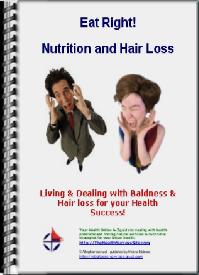Causes and Treatments Of Hair Loss
Nearly eighty million American women and men suffer from hereditary hair loss or alopecia. Alopecia can impact more than just the hair on the head, it can also affect body hair as well. It isn’t unusual to lose more than 100,000 hairs on the head during the day and this loss is typically replaced with new hair. When this hair loss is not continually replaced, then male and female pattern baldness starts to occur, generally happening gradually over a period of years.
If you’re losing more than the normal amount of hair, it may be difficult to notice unless you see the following:
• Thinning patches in the hair
• Large amounts of hair in the drain after a shower or after washing the hair
• Bunches or clumps of hair in the hair brush
• Bald patches on the scalp
If it seems you are losing more hair than you normally do, consult a doctor to see exactly what is causing the condition. A doctor will discuss the symptoms with you to determine what is causing the condition and how best to treat it. If there is a family history of male or female-pattern baldness, you may have this condition and it can onset as early as puberty.
Some incidences of hair loss may be triggered by disease, illness or even stress. Major hormonal changes associated with menopause, childbirth, pregnancy, or beginning or discontinuing birth control may also trigger hair loss. There are certain medical conditions which can also trigger hair loss including scalp infections, thyroid disease, and alopecia areata which is an autoimmune disease which attacks the hair follicles. Lupus can also cause hair loss, as can medications used to treat arthritis, high blood pressure, depression, heart problems, and cancer.
Trauma can also trigger hair loss, as well, including emotional and physical shock. A death, high fever or extreme weight loss are all extreme trauma triggers for hair loss. The mental illness trichotillomania which is a hair-pulling disorder creates a compulsion in people to pull out their hair, eyebrows or eyelashes. Additionally, some very tight hairstyles which put tension on the hair follicles will also cause hair loss. Another cause of hair loss are certain nutritional deficiencies especially in iron and protein.
Diagnosing hair loss consists of considering and analyzing several different factors. A doctor, or perhaps a dermatologist with conduct a physical examination and ask about your health history. The treatment may be as simple as a simple diet change or perhaps taking a prescribed medication.
Prescribed medications for male-pattern baldness include finasteride which is also known as Propecia. It is a daily medication which slows hair loss. It seems to also stimulate new hair growth as well.
An over-the-counter medication for alopecia is minoxidil also called Rogaine. Minoxidil is most successful when used with other hair loss treatments such as diet changes or prescription medications.
Another medication sometimes prescribed to help reduce the inflammation of alopecia areata is corticosteroids such as prednisone. These types of medications will also suppress the immune systems as well, so must be monitored very carefully by the physician.
Hair loss may happen, but it can be treated and may not be permanent. Depending upon the underlying causes of the hair loss, it may even be reversed. There are over-the-counter and prescribed medications that can help delay or prevent hair loss and which may even stimulate hair regrowth, but which should be administered under the supervision of a physician.
Learn more here in our online guide about how to deal with hair loss and ways to take preventative steps by keeping your hair healthy
Resources :
 Free Report Reveals tips for “Eat Right! Free Report Reveals tips for “Eat Right! Using Good Nutrition to Prevent Hair Loss” Free Health Book. - Living & Dealing with Hair loss or Baldness. Hair loss is something that over half of the men in this world (and a lot of women too) will have to deal with at some point in their lives. Click the link above or book cover to get your free Report & eCourse today! |
the A to Z directory of dealing with Health Problems & Self Care Strategies for natural remedies to your health issues.

Subscribe to get your weekly "Health Success Magazine" with a new complete & comprehensive Health Report in every edition!

to “Your Health Success”
our weekly F’R’E’E’ Newsletter
If you would like a free no-obligation private consultation or to contact Warren Tattersall for more information, please click here >> Contact Us

Click the books above to learn more about how we treat CFS naturally, to get your life back!
You will find many assorted Health Reports available for download free to you on this website!
Our free Health Success Reports are each available for you to download when you subscribe to receive them and their 7 part eCourse.
You can unsubscribe at any time, but we are sure you will want to receive all the email lessons of these informative ecourses.
Read more HERE to select the REPORT subjects of most interest (or concern) to you.









